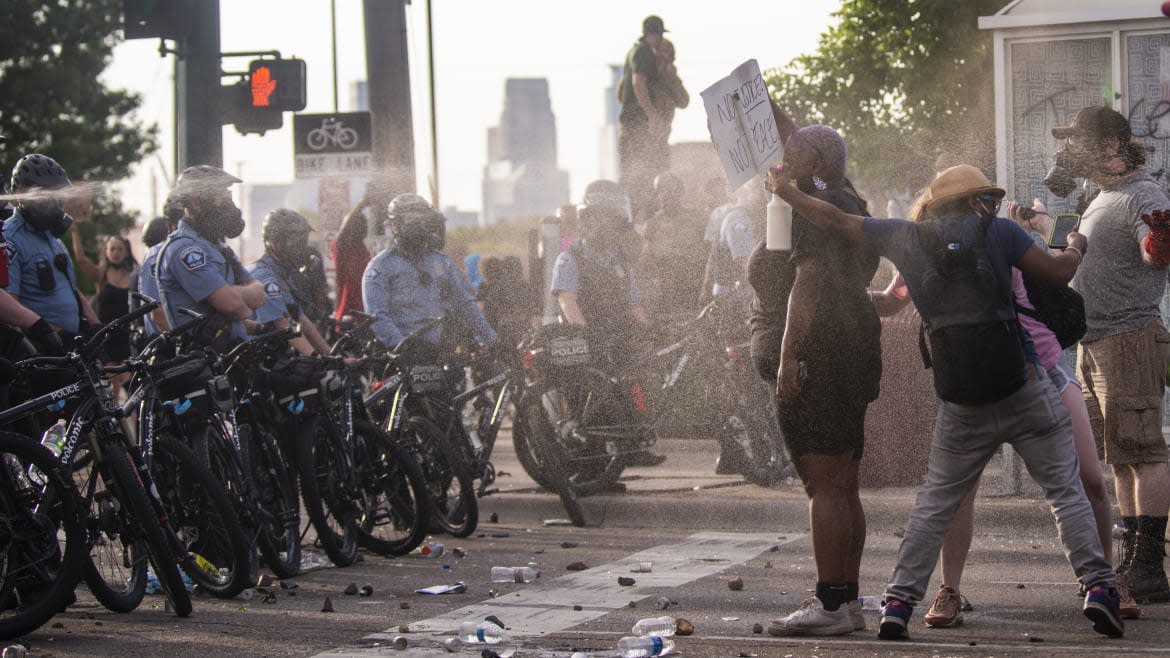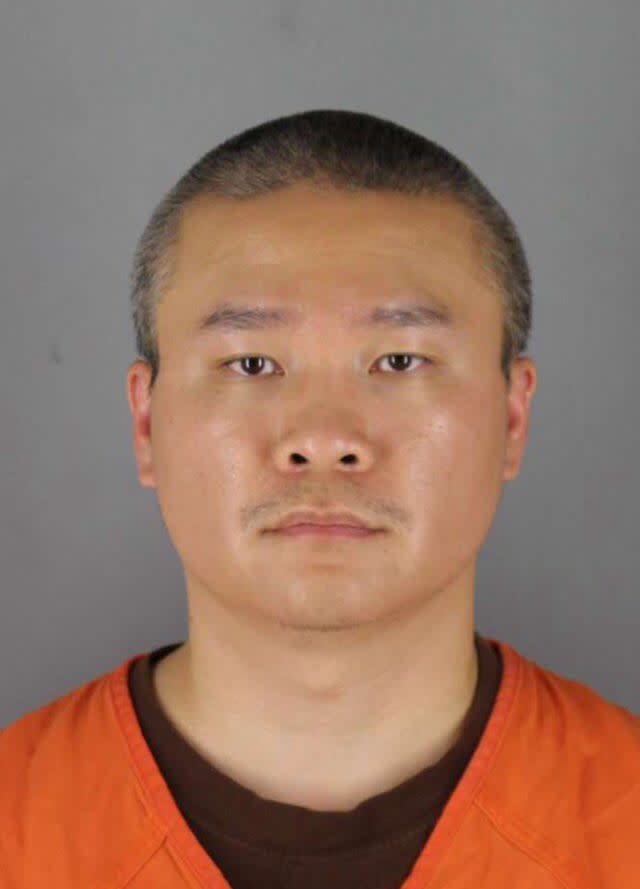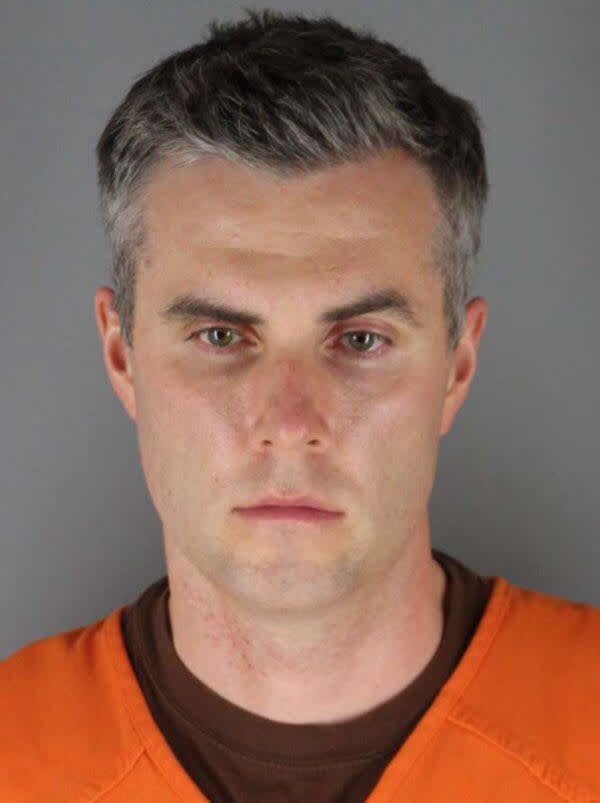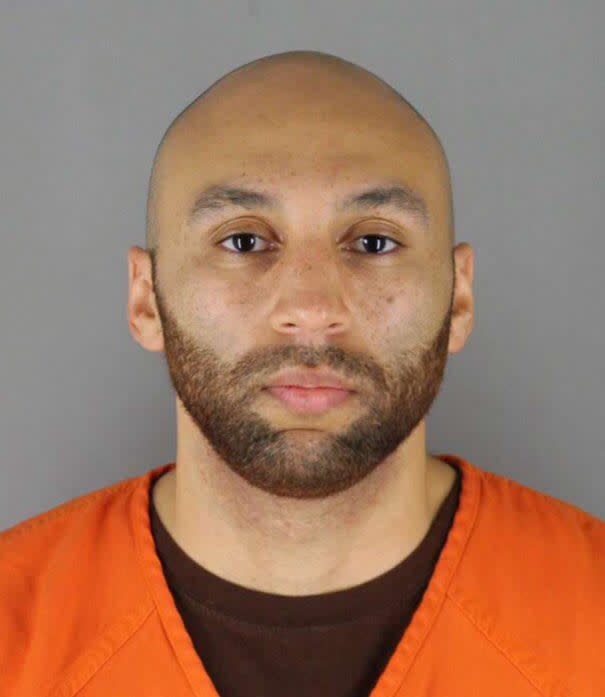‘He Should Be Here’: All Four Officers Now Face Charges Over George Floyd’s Killing

The three other Minneapolis cops involved in the police killing of George Floyd—an unarmed black man who was filmed repeatedly saying he couldn’t breathe while an officer held his knee on his neck for several minutes—have been charged in his death.
The three former officers —Thomas Lane, Tou Thao, and J. Alexander Kueng—have been charged with aiding and abetting second-degree murder while committing a felony and with aiding and abetting second-degree manslaughter with culpable negligence, according to criminal complaints filed by the state of Minnesota on Wednesday.

Tou Thao
Chauvin, who held his knee on Floyd's neck for almost nine minutes, was also charged with second-degree murder, after initially being charged with third-degree murder and manslaughter last week.
“We’re here today because George Floyd is not here. He should be here,” Minnesota Attorney General Keith Ellison said in a Wednesday press conference announcing the charges. “The world heard Floyd call out for his mama and, ‘Please don’t kill me.’”
According to Minnesota state law, second-degree murder is not premeditated but the suspect did intend to cause death. The charge typically carries a maximum penalty of 40 years behind bars. The other three officers face a maximum prison sentence of six years.
All four cops were fired one day after explosive footage of the May 25 incident spurred a national outcry and protests that have at times turned violent across the country.

Thomas Lane
Ellison, who said Wednesday that the additional charges are “following the path of all evidence,” issued “a word of caution” about the uphill battle his office will face in the impending prosecution.
“Trying this case will be hard. History does show there are clear challenges here. But we will seek justice and we will find it,” he said. “What I do not believe is one successful prosecution can rectify the hurt and loss that so many people feel. The solution to that pain will be slow and difficult work of construction justice and fairness in our society. That work, is the work of all of us.”
Cop’s Knee Was on George Floyd’s Neck for Almost 9 Minutes
Floyd family attorney Benjamin Crump—who spoke outside the Cup Foods in Minneapolis where Floyd was initially arrested and which has turned into an open air community center—said that while the announcement of the new charges is “a bittersweet moment,” the Floyd family is “deeply gratified” that the attorney general took action.
“We got all four,” the crowd chanted in the downtown Minneapolis neighborhood after news broke about the charges, several holding up their hands. Then, the crowd observed eight minutes of silence in honor of the amount of time Chauvin held his knee on Floyd’s neck during the arrest.
“It was a public lynching. It was a modern day lynching. He died the same way he would have died if he was lynched,” Mike Jackson told The Daily Beast, adding that he flew to Minneapolis from his home in Baltimore after seeing the video of Floyd’s killing. “This is the holy grail; this is the new Mecca. The world is watching. They’ll all come here.”
His friend, Cece Boyd, added that without the days of protest, none of the officers would have been arrested.
“Look at history,” Boyd told The Daily Beast. “Without all this, none of them would have been arrested. And If a black man would have killed a white officer, they would have killed him, they would have executed him.”
Ahead of Ellison’s announcement, a crowd of hundreds sang the most famous song from the city’s most famous son: Prince’s “Purple Rain.” As the attorney general spoke, residents continued eating, talking, and taking photos at the exact spot where Floyd was killed, and listening to speakers who led chants from the middle of the intersection—where a massive circle of flowers lay in the 46-year-old’s memory.
With peace consuming the block and washing over the city after a week of unrest, a sense of calm and normalcy took hold at 38th and Chicago. But Lillian Toines, 33, told The Daily Beast the specter of unrest will remain until the officers are convicted.
“I feel like this is only the beginning. I feel like if those cops aren’t convicted, people are going to escalate things,” Toines said. “What is so hard for America to convict killer cops? Will we will risk America for four cops? Is America that afraid to convict murderers?”
The decision to file charges against the three officers comes after days of both peaceful and chaotic protests across the country, where residents in all 50 states took to the streets, sometimes clashing with authorities in the fight against police brutality. The National Guard has been deployed in almost half the states in the nation, plus Washington, D.C., after officials found local cops were insufficient to contain the outrage alone.
An amended criminal complaint filed for Chauvin on Wednesday outlines the events leading up to the now-infamous video of the 44-year-old officer pinning his knee on Floyd’s neck until he lost consciousness. Prosecutors said two officers, Lane and Kueng, initially responded to a call at 8:08 p.m. on May 25 that Floyd had used a counterfeit $20 bill at a convenience store.
When the two officers found Floyd in his car, along with two passengers, they asked him to get out. The complaint says Lane then pointed a gun at Floyd and ordered him to show his hands. When Floyd put his hands on the steering wheel, Lane put his gun away and pulled the 46-year-old out of the car.
Once handcuffed, Floyd walked with Lane to the sidewalk and sat on the ground, and calmly said: “Thank you, man.” The complaint states that Lane then told Floyd to give him his name and identification, and asked if he was “on anything” after noting there was foam at the edges of his mouth.
Minneapolis Police Launch ‘Unprovoked’ Attacks on Protesters and Journalists
After the two-minute conversation, Lane and Kueng then walked Floyd to their squad car, at which point he stiffened up and fell to the ground while saying he was claustrophobic. Officers Chauvin and Thao arrived to help and all four men tried several times to get Floyd in the car, but he kept “intentionally falling down” and saying he couldn’t breathe, the complaint states.
When Floyd fell down again, Kueng held his back and Lane held his legs—while Chauvin placed his knee on the unarmed man’s neck. The move prompted Floyd to call out for his mother and say several times that he couldn’t breathe. “I’m about to die,” he warned.
Prosecutors said Thao “then became concerned about a number of citizens who had gathered and were watching the officers subdue Mr. Floyd and potential traffic concerns,” so he stood in between the bystanders and the officer.
“When one citizen stepped off the curb, imploring Chauvin to get off Mr. Floyd,” Thao “put his hands on the citizen to keep him back,” the complaint says.
Later, Lane asked his fellow officers if they should roll Floyd on his side, saying, “I’m worried about excited delirium or whatever.” Chauvin responded: “That’s why we have him on his stomach.” The complaint states that Chauvin and Kueng then held Floyd’s right hand up, while the other officers stayed in their positions.

Alexander Kueng
After Floyd stopped moving at around 8:24 p.m., Lane again suggested moving him onto his side, while Kueng checked for a pulse but couldn’t find one. The officers never changed Floyd’s position, prosecutors said.
By the time Floyd was loaded into an ambulance, he had no pulse.
“The defendant and Officers Lane and Kueng subdued Mr. Floyd prone to the ground in this manner for nearly 9 minutes. During this time, Mr. Floyd repeatedly stated he could not breathe and his physical condition continued to deteriorate such that force was no longer necessary to control him,” the complaint states.
Prosecutors added that “Chauvin’s restraint of Mr. Floyd in this manner for a prolonged period was a substantial causal factor in Mr. Floyd losing consciousness, constituting substantial bodily harm, and Mr. Floyd’s death as well.”
The three other officers “intentionally aided” in Floyd’s death by “culpable negligence... and consciously [taking] the chances of causing death or great bodily harm,” prosecutors said.
Philadelphia Goes From Calm to Chaos in an Instant
An updated report from the Hennepin County Medical Examiner indicated that Floyd died due to cardiac arrest from the restraint and neck compression. The medical examiner’s office report also states there were indications Floyd had heart disease, including “arteriosclerotic and hypertensive heart disease,” and there was fentanyl in his system.
An independent report commissioned by Floyd’s family, however, states that the 46-year-old was in good health and died of strangulation from pressure to his back and neck. Both reports concluded that Floyd’s death was a homicide.
“When [Floyd] said, ‘I can’t breathe’... police think that if you can talk then you can breath. That is not true,” celebrity pathologist Dr. Michael Baden said in a Monday press conference announcing the report, adding that Floyd has no underlying medical condition that would have contributed to his death. “He was in good health. The cause of death is asphyxia compression of the neck and back.”
U.S. Attorney General William Barr announced Friday the Department of Justice—including the FBI—were conducting their own investigation of Floyd’s death. On Sunday, Gov. Tom Walz announced Minnesota Attorney General Keith Ellison is taking the lead in Chauvin’s prosecution.
“When he couldn’t breathe, none of us could breath, so this is a tipping point... to change America and see if America truly believes in the words of Thomas Jefferson that we would believe these truths to be self evident that all men are created equally,” Crump said Wednesday.
Got a tip? Send it to The Daily Beast here
Get our top stories in your inbox every day. Sign up now!
Daily Beast Membership: Beast Inside goes deeper on the stories that matter to you. Learn more.

